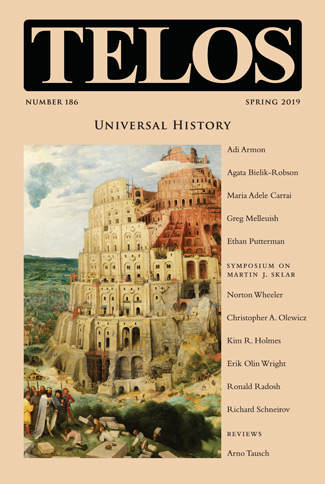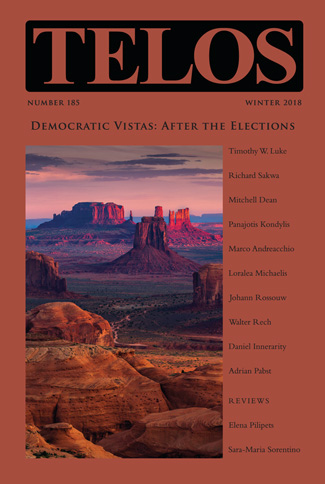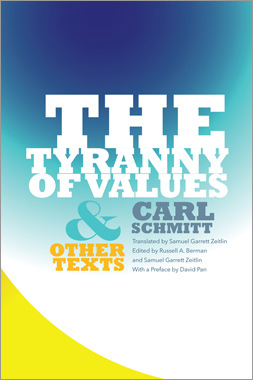By Ethan Putterman · Thursday, April 11, 2019 Ethan Putterman’s “Locke and ‘War by Design’” appears in Telos 186 (Spring 2019). Read the full article at the Telos Online website, or purchase a print copy of the issue in our online store. Individual subscriptions to Telos are available in both print and online formats.
 Few passages in John Locke’s writings are more controversial than the incongruous descriptions of the state of nature in chapters III and IX of the Second Treatise on Government. A hodgepodge of opposites where men live at once in a “State of Peace, Good Will, Mutual Assistance, and Preservation” yet remain “very unsafe, very unsecure,” Locke’s state of nature is, according to John Dunn, “probably the most misunderstood idea in the English radical’s political philosophy.” In this article, I explore Locke’s epistemology behind humankind’s comprehension of natural law to argue that his state of nature is more consistent than appears. I demonstrate that the symmetry of the philosopher’s state of nature is best understood by way of the theory of knowledge in his Essays on the Law of Nature and Essay Concerning Human Understanding. Few passages in John Locke’s writings are more controversial than the incongruous descriptions of the state of nature in chapters III and IX of the Second Treatise on Government. A hodgepodge of opposites where men live at once in a “State of Peace, Good Will, Mutual Assistance, and Preservation” yet remain “very unsafe, very unsecure,” Locke’s state of nature is, according to John Dunn, “probably the most misunderstood idea in the English radical’s political philosophy.” In this article, I explore Locke’s epistemology behind humankind’s comprehension of natural law to argue that his state of nature is more consistent than appears. I demonstrate that the symmetry of the philosopher’s state of nature is best understood by way of the theory of knowledge in his Essays on the Law of Nature and Essay Concerning Human Understanding.
Continue reading →
By David Pan · Monday, March 18, 2019 Telos 186 (Spring 2019) is now available for purchase in our store. Individual subscriptions to Telos are also available in both print and online formats.
 This issue is devoted to the question of universal history and is based in part on a 2015 Telos-Paul Piccone Institute conference organized by Greg Melleuish. As this event suggested, universal history today imagines the convergence of humanity around a single trajectory of capitalist technological progress coupled with the defense of liberal rights. But as much as technology has increasingly linked the world into a single movement of history, we cannot say the same about liberal rights. Rather than pointing us toward the liberal light at the end of the historical tunnel, world politics seems to be casting us into the blazing arena of the “clash of civilizations” presaged by Samuel Huntington, with different regions of the world—Africa, America, Asia, Europe, the Muslim world—increasingly at odds, each region with a dominant civilization pursuing its own cultural and political hegemony. This divergence between a materialist unity of development and a cultural fragmentation frames the problem of universal history. This issue is devoted to the question of universal history and is based in part on a 2015 Telos-Paul Piccone Institute conference organized by Greg Melleuish. As this event suggested, universal history today imagines the convergence of humanity around a single trajectory of capitalist technological progress coupled with the defense of liberal rights. But as much as technology has increasingly linked the world into a single movement of history, we cannot say the same about liberal rights. Rather than pointing us toward the liberal light at the end of the historical tunnel, world politics seems to be casting us into the blazing arena of the “clash of civilizations” presaged by Samuel Huntington, with different regions of the world—Africa, America, Asia, Europe, the Muslim world—increasingly at odds, each region with a dominant civilization pursuing its own cultural and political hegemony. This divergence between a materialist unity of development and a cultural fragmentation frames the problem of universal history.
Continue reading →
By Loralea Michaelis · Monday, February 25, 2019 Loralea Michaelis’s “Temporality and Revolution in Horkheimer’s Early Critical Theory: A Luxemburgian Reading of Dämmerung” appears in Telos 185 (Winter 2018). Read the full article at the Telos Online website, or purchase a print copy of the issue in our online store. Individual subscriptions to Telos are available in both print and online formats.
 This article challenges the related assumptions about temporality and the significance of success and failure for revolutionary activism that have governed the standard interpretation of Horkheimer’s critical theory as foundering on the disappointment of its early revolutionary expectations. The early influence of Luxemburg on Horkheimer is used to bring into clearer focus Horkheimer’s handling of the problem of a failed revolution in Dämmerung, his earliest published work, which bears a striking resemblance to Luxemburg’s own positions on the centrality of failure to the development of the revolution as well as her critique of the success-oriented politics of reformism. Dämmerung foregrounds the German revolution of 1919–23, but the working through of its failure yields not pessimism over the future but a challenge to the preoccupation with future prospects which underlies both pessimism and optimism; it also yields a conception of revolution as a present-oriented resistance that not only does not expect to succeed in its aims but regards the aim of success with a skeptical eye. Contrary to the standard reading, the failed revolution is not a problem for which Horkheimer’s early critical theory needs to find a solution; rather, it is its practical correlative. This article challenges the related assumptions about temporality and the significance of success and failure for revolutionary activism that have governed the standard interpretation of Horkheimer’s critical theory as foundering on the disappointment of its early revolutionary expectations. The early influence of Luxemburg on Horkheimer is used to bring into clearer focus Horkheimer’s handling of the problem of a failed revolution in Dämmerung, his earliest published work, which bears a striking resemblance to Luxemburg’s own positions on the centrality of failure to the development of the revolution as well as her critique of the success-oriented politics of reformism. Dämmerung foregrounds the German revolution of 1919–23, but the working through of its failure yields not pessimism over the future but a challenge to the preoccupation with future prospects which underlies both pessimism and optimism; it also yields a conception of revolution as a present-oriented resistance that not only does not expect to succeed in its aims but regards the aim of success with a skeptical eye. Contrary to the standard reading, the failed revolution is not a problem for which Horkheimer’s early critical theory needs to find a solution; rather, it is its practical correlative.
Continue reading →
By Mitchell Dean · Friday, February 8, 2019 Mitchell Dean’s “Oath and Office” appears in Telos 185 (Winter 2018). Read the full article at the Telos Online website, or purchase a print copy of the issue in our online store. Individual subscriptions to Telos are available in both print and online formats.
 The oath pertains to law, sovereignty, and office. A public servant takes an oath. A witness and a juror at a trial swear an oath. The British monarch swears a coronation oath and the president-elect of the United States an oath of office. While the coronation of the monarch has been regarded as “medieval” and the inauguration of the president as “ceremonial” or “symbolic,” it would be a mistake to view them as empty rituals, particularly the oaths taken. And while the oath invokes God, it would be an error to assume that it is merely an atavism, a retroversion, or a vestige of a more religious past. But what it is and what it does is far from clear, including to those who swear oaths. When President Obama, sworn in by Chief Justice John Roberts, misspoke his oath of office in January 2009, he was advised to retake it the next day, as the White House counsel put it, “out of an abundance of caution.” Ex abundanti cautela might indeed by the principle that scholars should adopt, given the thicket of false trails, unfathomable origins, prejudices, and commonplaces that afflict any attempt to study this practice. The appropriate method to study the oath uses multiple examples and cases, considers them from as many different viewpoints as it can, and remains wary of both our commonsense assumptions about its origins and efficacy and their theoretical correlates. The oath pertains to law, sovereignty, and office. A public servant takes an oath. A witness and a juror at a trial swear an oath. The British monarch swears a coronation oath and the president-elect of the United States an oath of office. While the coronation of the monarch has been regarded as “medieval” and the inauguration of the president as “ceremonial” or “symbolic,” it would be a mistake to view them as empty rituals, particularly the oaths taken. And while the oath invokes God, it would be an error to assume that it is merely an atavism, a retroversion, or a vestige of a more religious past. But what it is and what it does is far from clear, including to those who swear oaths. When President Obama, sworn in by Chief Justice John Roberts, misspoke his oath of office in January 2009, he was advised to retake it the next day, as the White House counsel put it, “out of an abundance of caution.” Ex abundanti cautela might indeed by the principle that scholars should adopt, given the thicket of false trails, unfathomable origins, prejudices, and commonplaces that afflict any attempt to study this practice. The appropriate method to study the oath uses multiple examples and cases, considers them from as many different viewpoints as it can, and remains wary of both our commonsense assumptions about its origins and efficacy and their theoretical correlates.
Continue reading →
By Telos Press · Friday, February 1, 2019 Writing at Infrapolitical Deconstruction, Gerardo Muñoz reviews the new English translation of Carl Schmitt’s The Tyranny of Values and Other Texts, now available from Telos Press Publishing. Order your copy in our online store, and save 20% on the list price by using the coupon code BOOKS20 during the checkout process.
An excerpt:
 As David Pan correctly observes in the Preface, the Schmitt that we encounter here is one that is confronting the transformations of political enmity in light of a gloomy and dangerous takeover of a global civil war. In fact, one could most definitely argue that the Schmitt thinking within the Cold War epochality is one that is painstakingly searching for a “Katechon,” that restraining force inherited from Christian theology in order to give form to the ruination of modern legal and political order. The global civil war, cloaked under a sense of acknowledged Humanism, now aimed at the destruction of the enemy social’s order and form of life. This thematizes the existential dilemma of a jurist who was consciousness of the dark shadow floating over the efficacy of Western jurisprudence. In other words, the post-war Schmitt is one marked by a profound Hamletian condition in the face of the technical neutralization of every effective political theology. This condition puts Schmitt on the defensive, rather than on the offensive, as his later replies to Erik Peterson, Hans Blumenberg, or Jacob Taubes render visible. As David Pan correctly observes in the Preface, the Schmitt that we encounter here is one that is confronting the transformations of political enmity in light of a gloomy and dangerous takeover of a global civil war. In fact, one could most definitely argue that the Schmitt thinking within the Cold War epochality is one that is painstakingly searching for a “Katechon,” that restraining force inherited from Christian theology in order to give form to the ruination of modern legal and political order. The global civil war, cloaked under a sense of acknowledged Humanism, now aimed at the destruction of the enemy social’s order and form of life. This thematizes the existential dilemma of a jurist who was consciousness of the dark shadow floating over the efficacy of Western jurisprudence. In other words, the post-war Schmitt is one marked by a profound Hamletian condition in the face of the technical neutralization of every effective political theology. This condition puts Schmitt on the defensive, rather than on the offensive, as his later replies to Erik Peterson, Hans Blumenberg, or Jacob Taubes render visible.
Continue reading →
By Marco Andreacchio · Thursday, January 31, 2019 Marco Andreacchio’s “Epistemology’s Political-Theological Import in Giambattista Vico” appears in Telos 185 (Winter 2018). Read the full article at the Telos Online website, or purchase a print copy of the issue in our online store. Individual subscriptions to Telos are available in both print and online formats.
The twentieth-century rise to fame of Giambattista Vico as anticipator of historical relativism obscures essential elements of the eighteenth-century philosopher’s message. Vico’s stringent argumentation points well beyond contemporary expectations, offering a classical alternative to both a political depreciation of metaphysics and a metaphysical depreciation of politics. Carrying on a Renaissance tradition inaugurated most notably by Dante Alighieri, Vico invites us to rediscover or return to the poetic language of pagan antiquity as political-theological key to philosophical reflection upon the nature of the human mind. What Vico intends to defend are not old myths as such, but the essential independence of the human mind from any and all myths, be they ancient, medieval, or modern.
Continue reading →
|
|
 Few passages in John Locke’s writings are more controversial than the incongruous descriptions of the state of nature in chapters III and IX of the Second Treatise on Government. A hodgepodge of opposites where men live at once in a “State of Peace, Good Will, Mutual Assistance, and Preservation” yet remain “very unsafe, very unsecure,” Locke’s state of nature is, according to John Dunn, “probably the most misunderstood idea in the English radical’s political philosophy.” In this article, I explore Locke’s epistemology behind humankind’s comprehension of natural law to argue that his state of nature is more consistent than appears. I demonstrate that the symmetry of the philosopher’s state of nature is best understood by way of the theory of knowledge in his Essays on the Law of Nature and Essay Concerning Human Understanding.
Few passages in John Locke’s writings are more controversial than the incongruous descriptions of the state of nature in chapters III and IX of the Second Treatise on Government. A hodgepodge of opposites where men live at once in a “State of Peace, Good Will, Mutual Assistance, and Preservation” yet remain “very unsafe, very unsecure,” Locke’s state of nature is, according to John Dunn, “probably the most misunderstood idea in the English radical’s political philosophy.” In this article, I explore Locke’s epistemology behind humankind’s comprehension of natural law to argue that his state of nature is more consistent than appears. I demonstrate that the symmetry of the philosopher’s state of nature is best understood by way of the theory of knowledge in his Essays on the Law of Nature and Essay Concerning Human Understanding. 



